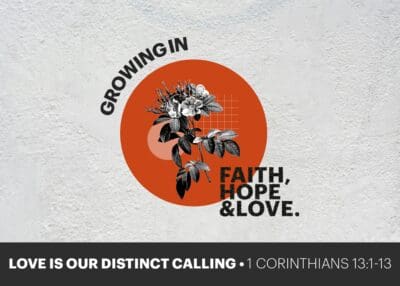I am my beloved’s and my beloved is mine. Song of Solomon 6:3
The whole Bible is a love story. It begins with God and God is love. Before anything else existed, love flowed between the Father, the Son, and the Holy Spirit. Jesus says to the Father, “You loved me before the foundation of the world” (John 17:24).
I still remember when I first heard this truth and the impact it made on me. I was a teenager, 16 years old, and I was in church on an ordinary Sunday morning. Our pastor in the little Baptist church where I grew up in Edinburgh, Scotland pointed to John 17:24. He said, “Before anything else existed, there was love.”
He spoke of one God who exists in three persons: Love flows between the Father, the Son, and the Spirit – it always has and always will. The life of God is filled with perpetual joy because of the constant self-giving and therefore receiving that takes place within his own nature.
I remember thinking as a teenager, “That is the most beautiful thing I have ever heard.” I remember thinking, “This is why love is so great!” This is why the longing to love and to be loved runs so deeply in all our hearts. We are made in the image of God. We are made to give and to receive love just as God does himself.
Jesus said that the greatest commandment is to “love God with all your heart, soul, mind, and strength.” This is what we were made for. This is your highest calling! And the second is like it, “love your neighbor as yourself.”
So what went wrong? Listen to this answer from Michael Reeves,
It was not that Adam and Eve stopped loving. They were created as lovers in the image of God, and they could not undo that. Instead, their love turned.
When the apostle Paul writes of sinners, he describes them as “lovers of themselves, lovers of money… lovers of pleasure, rather than lovers of God” (2 Timothy 3:2-4).
Lovers we remain, but twisted, our love misdirected and perverted. Created to love God, we turn to love ourselves and anything but God. [1]
The heart of what the Bible calls “sin” is a misdirected love, a disorder in the affections – loving the wrong things. That’s the fundamental human problem.
That’s why our first instincts are not to seek God but to hide from him. When Adam loved God, he walked with him in the garden. But when Adam’s love turned, he hid from God.
When Jesus came into the world and he called the first disciples, he unveiled his glory by giving them a miraculous catch of fish. When Simon Peter saw this, and he perceived something of the glory of God, he fell down at Jesus knees, “Depart from me, for I am a sinful man.”
Peter was saying, “I don’t belong here with you! You had better find someone else who is more holy than me. I’m not the kind of person you are looking for” (Luke 5:8).
Here was Peter, hiding from God. Isn’t that the saddest and most tragic waste of all, for a human being to be running away from love? Hiding from the God who loves you.
Christ did not let Peter go. “Don’t be afraid,” he said. Peter brought the boat to land, and then he left everything and followed Jesus.
Years later this same man, Peter, described why Jesus Christ came into the world: “Christ… suffered once for sins, the righteous for the unrighteous, that he might bring us to God” (1 Peter 3:18), that he might bring us out of hiding and back into relationship with him.
Peter is saying, “He went to that cross so that people like us who love the wrong things and feel that we don’t belong anywhere near God should be brought back to him.”
This was what Jesus had in mind when he went to the cross. On the night he was betrayed, he prayed to the Father “that the love with which you have loved me may be in them” (John 17:26).
That is an amazing prayer! That the love with which the Father has loved the Son… the love that has always flowed in the heart of God should be in us!
The great purpose for which Jesus suffered was to bring us into his own enjoyment of the Father’s love. His purpose was that you should enter into the shared delight of the Father and the Son, and be caught up in the circle of their love.
That is surely why at the end of the Bible you have the marriage supper of the lamb – the shared joy of the Father, and of his Son, and of his bride. The great storyline of the Bible is the story of love.
That’s why we are in the Song of Solomon. We have this story of a king’s love for his bride, and the bride’s love for her husband. Think about what it meant for this lady who loved the king – the bride on whom the king’s love was showered.
Solomon was known around the world for his wealth. So in becoming his, the bride would find herself surrounded by servants. The new life that she would enter was unimaginably rich.
What I want you to notice is that in all of this book she does not say a word about any of that. Her song is not about the lifestyle into which the king had brought her. It is about the king himself – her love for him and his great love for her.
This is beautifully encapsulated in our verse today: “I am my beloved’s and my beloved is mine” (Song. 6:3). The relationship of Christ and his people is a bond of love.
1. Beware of the Gold Digger Mentality
I checked the dictionary for a definition of “gold digger,” and this is what I found in Merriam-Webster:
gold digger (noun) a woman who becomes or tries to become romantically involved with a rich man in order to get money and gifts from him
That seems to be to be a somewhat sexist definition, since I am sure it can happen the other way round. Think about this with me. Picture a rich widow who is very wealthy. She lives in a marvelous home. She enjoys the most exotic vacations.
A man comes alongside her. He becomes romantically involved with her, and in the end he marries her. So, he enjoys all the benefits of the life that he now shares with her.
But he does not love her. He never did. His whole intent, right from the beginning, was simply one thing – that he should have a share in what she enjoyed.
What would you think about this man? Is he someone you admire? Would he be a role model for you? You would not admire him. You would call him a gold digger. You would think him selfish, dishonorable, unworthy. And you would be right.
But is this not precisely how we have often regarded Jesus Christ: He owns heaven. He can get us out of hell. He can get the blessing of God on us. That’s what we want so we “accept” him.
Accept him? Isn’t that a strange way for a Christian to talk about our Savior? I would never say that when I married my wife, I accepted her. I love her!
A.W. Tozer sounded the alarm over what I am calling gold digger Christianity: The whole transaction of religious conversion has been made mechanical and spiritless… Christ may be ‘received’ without creating any special love for Him in the soul of the receiver. The man is ‘saved’ but he is not hungry and thirsty after God. [2]
Tozer wrote these words in 1948. That’s 66 years ago, which means that most of us have been breathing this air all of our lives: “God digger Christianity. Get out of hell. Get into heaven. Get God on your side to give you what you want!” But very little love for Jesus Christ.
Open the Bible, and you find something very different. Peter says this about Christians and their relationship with Jesus Christ: “Though you have not seen him, you love him” (1 Peter 1:8). Beware of the gold digger mentality!
Gold digger profile
Christ gives us a profile of believers with the gold digger mentality when he speaks to the church at Ephesus. He says three things…
- “I know your works, your toil and your patient endurance” (Rev. 2:2). These people are hard workers in the church. They are staunch, loyal folks who stick at it with steady tenacity.
- “You cannot bear with those who are evil, but have tested those who call themselves apostles and are not, and found them to be false” (Rev. 2:2). These people have moral integrity, doctrinal soundness, and they’re sticklers for truth – this is commended by Christ.
- “But I have this against you, that you have abandoned the love you had at first” (Rev. 2:4). You are doing the work. You are living the life. But whatever happened to: I am my beloved’s and my beloved is mine? I don’t hear that from you.
So, Jesus says, “Repent, and do the works you did at first. If not, I will come to you and remove the lampstand from its place” (Rev. 2:5). Christ is talking about the church here.
The life of a church cannot be sustained by hard work, right living, and doctrinal correctness. The life of the church (and the life of a Christian) lies in our love for Christ, which is a reflection of his great love for us. Beware of the gold digger mentality! Beware of looking to Christ simply for what he can give you, and not really loving him.
When did the Lord last hear you tell him that you love him? Don’t let today, or any day, end without saying that to him.
The best time of all to tell the Lord that you love him is when you experience pain and loss or endure great difficulty. There’s nothing surprising about a Christian who loves God when life is going well. But Christians who love God when his good gifts are taken away demonstrate to heaven and to hell (as well as this world) that they really do love God and not just his gifts.
This was the main point of the book of Job, which begins with Satan’s great slander against God, “The only reason Job loves you, is that you’ve filled his life with blessings. You have showered him with wealth. You have surrounded him with loved ones. Job is blessed and he knows where his bread is buttered. That’s why he loves you!”
Of course Satan would say such a thing, because hell knows nothing of love. Satan cannot believe that anyone would love God for who he is. So he slanders God by accusing him of buying Job’s affection.
One gift after another was stripped away from Job. This godly man walked through the dark valley of pain and struggled with many unanswered questions, but he did not cease to love God.
“Though he slay me, yet shall I trust him. I know that my Redeemer lives and though worms destroy this body yet in my flesh, I shall see God” (Job 19:25-26, author’s paraphrase).
When Job loved God in the middle of his pain and suffering, his testimony glorified God in heaven, it silenced Satan in hell, and for thousands of years it has brought strength and comfort to millions of believers when they endure suffering.
Loving Christ still, in the middle of unexplained suffering or loss, may be the greatest contribution you will ever make to glorifying Christ, to advancing his kingdom in the world, and to pushing back Satan’s boundaries.
Loving Christ still in the face of pain and loss, glorifies God in heaven, causes consternation in hell, and brings strength to brothers and sisters who gather courage because of the reality of our love for Christ.
2. Enjoy the Strength of Christ’s Love
My beloved is mine. Song of Solomon 6:3
One great blessing of being a Christian is that you can say, “Christ is mine!” There’s strength, peace, confidence, and security in that. “Christ is mine. I am in him. He is in me. And none of this is in doubt.”
This is an intensely personal statement: My beloved is mine. Jerry Bridges shares his personal testimony of this in one of his books.
There was a period in my early Christian life when my concept of God’s love was little more than a logical deduction: God loves the world; I am part of the world; therefore, God loves me.
It was as if God’s love were a big umbrella to protect us all from his judgment against sin, and I was under the umbrella along with thousands of other people. There was nothing particularly personal about it. Then one day, I realized, “God loves me! Christ died for me.” [3]
Have you come to this place? It’s transforming! That’s what the apostle Paul is talking about here: “The Son of God… loved me and gave himself for me!” (Gal. 2:20).
Christ had me in view when he came into the world and when he died on the cross, and when he rose from the dead. Right now, he has me on his heart at the right hand of the Father, and when he comes again in glory it will be to get me, and to take me into the nearer joy of his presence.
Friends, enjoy the strength of Christ’s love for you. This is one of the greatest things about being a Christian. He is always for you, always with you, always working for your good. Let this be your strength and your light, your hope and your joy. You can say, “My beloved is mine!”
Think of all the other things in this world of which you would say, “mine.” All the other gifts in life are given to you for a time. They have a beginning, a middle, and an end. You can say “mine” in reference to your home, your work, your money, or your loved ones.
But all these are yours only for a time. When you say of Christ, “My beloved is mine,” you can know for sure that he is yours forever.
3. Give Yourself to Christ without Condition or Reservation
I am my beloved’s. Song of Solomon 6:3
That is a marvelous statement of complete self-giving. Are you able to say this with regard to Christ? When you see the love of Christ for you, this will be your response to him.
What could possibly hold you back from giving yourself without condition or reservation to Jesus Christ? What would you be afraid of when he loves you as he does?
The great sadness that I feel for some of you who are still holding out on Jesus Christ is that you show by your reluctance to give yourself to him that you have not yet discovered his love. The reason that you are not yet his, is that he is not yet yours. And the reason he is not yet yours, is that you are not yet his.
Christ stands at the door of your life and knocks. This Savior who loves you, stands outside of your life and he waits to be invited in. When he becomes yours, you will become his. You will be able to say of Christ with all the family of God, “I am my beloved’s and my beloved is mine.”
What a blessing it is to go through life knowing who you are and to whom you belong. I was listening to a message from Sinclair Ferguson the other week in which he said that one of the great blessings of being a Christian, for him, was that it had simplified his life.
We go through life facing so many demands – work, family, children, and church. People are asking things of us and putting things on us. How do you keep all the balls in the air? Sometimes you come to a place where you find yourself saying – “Who am I am, and what in the world am I supposed to be doing?”
Here’s where you begin: I am my beloved’s. That’s who I am. I belong to Christ, and that is the most important thing about me.
And Christ is mine. That’s how I am going to face the challenges of my life this week. Christ is with me; Christ is for me, and Christ will never let me go.
[1] Michael Reeves, “Delighting in the Trinity,” p. 65, IVP Academic, 2012
[2] A. W. Tozer, “The Pursuit of God,” p. 12, Regal, 2013
[3] Jerry Bridges, “The Practice of Godliness,” p. 25, NavPress, 1996





